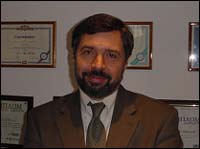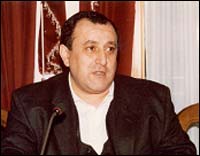 INFORMATION TECHNOLOGIES - PROVING THEIR VALUE
INFORMATION TECHNOLOGIES - PROVING THEIR VALUE
|
The Russian IT market is relatively young and small
(some 1% of Russia's GDP) compared to the western
markets. From its inception IT has been one of the
most market-oriented sectors in the Russian economy.
Many Russian IT corporations followed Western models
of development, marketing and management in partnership
with Western companies. The sector has recorded
continued success with growth rates of 30 percent
before 1998 and around 9 percent after the crisis.
Today, the largest consumers of information technologies
in Russia are in the corporate sector and government
bodies that previously only bought hardware and
used rather primitive software. In both of these
sectors one sees the will to create efficient management
systems and models.
Strong efforts are being made by the Ministry for
Communications and Informatization, lead by Minister
Leonid Reiman, and the Ministry of Economic
Development and Trade to elaborate the Electronic
Russia (e-Russia) program, which has $2.5 billion
marked down for its implementation. The e-Russia
program, which aims to optimise Ministries' management
processes and bring IT to the Russian population,
is the first of its kind to include more than 600
investment projects implemented by 300 enterprises.
Unsurprisingly, the government is a major driver
of growth in Russian IT, racking up some 35-40 percent
of total demand.
Increasingly, though already common in western markets,
IT and telecommunications are merging in Russia.
This is clearly reflected in the operations of one
of Russia's key IT players. As the most experienced
and one of the biggest companies in the Russian
IT market, the Verysell Group of Companies has played
a very important role in introducing information
technologies to Russia's corporate world. The Group
consists of Verysell Distribution, Company OBINKO
(an integrator of corporate management systems or
accounting systems), Verysell Telecom (the most
dynamic and profitable part of the Group) and Verysell
Express. While reviewing its strategy, the Group
reassessed the Russian market, which achieved a
high degree of maturity. Therefore, rather than
copying West European firms, Verysell became a primarily
'Russian business style-oriented' company with three
businesses: distribution, telecoms and systems integration.
"All activities are targeted on taking the
best from the leading manufacturers in the west
and supplying that technology to the Russian economy",
says Mikhail Krasnov,
President of Verysell.

Mikhail Krasnov, President
of Verysell
More than $0.7 billion worth of
products from world's leading computer manufacturers,
Hewlett Packard-Compaq, IBM, Lexmark, Microsoft,
Novell, and Sun Microsystems, have been sold through
the channels of Verysell over the 12 years. Krasnov,
however, sees the convergence into one market
of IT and Telecommunications. With this in mind,
"The consultancy business is positioned to
deal with telecoms and IT, if you take any major
project it is not possible to make this division
between telecoms and IT: it is both. There is
no IT system without telecommunications,"
stresses Krasnov.
With growth figures ranging between 80-100% in
the Internet segment of Russian IT, Internet providers,
such as Garant
Park Telekom, have no reason to complain.
In respect of Internet use in corporate Russia,
Oleg
Bevz, the jovial head of the Moscow Representation
of Internet Securities Inc., gives a good indication
of the latest developments. As the Russian representative
of one of the worlds leading providers of business
information on emerging markets remembers, "when
I first came to Russia in 1996: it was a rare
thing to find in the companies an Internet connection
of good quality…Internet communication has
expanded dramatically over the last five to six
years and of course we get a lot of feedback from
our customers, both on the ISI system and on the
services we provide." Sergei
Tarasov, Country Manager of Sun Microsystems in
Russia, notes that the Russians "...do
not have a lot of inherited systems that contradict
the internet age. The lack of the inherited system
helps Russia to adopt Internet projects."
There are several pathfinders in providing eBusiness
solutions in Russia, like Actis
Systems which has been around since 1997.
Actis is the leading company in the Internet services
segment, providing full-spectrum integrated internet
services to multinationals and top Russian companies,
working in Russia and abroad. "We are currently
finally seeing many big companies starting to
do what they should be doing with the internet:
using it as a serious business tool. We help companies
identify where they can become more efficient
through the use of internet technologies. We help
our clients to look further down the line to increase
revenues", indicates Edward Grinbukh, CEO
of Actis Systems. Since its founding, the company
has completed close to 400 commercial projects
in 23 countries worldwide. Its main markets for
design and programming are Russia, the US, Germany,
and the UK. Actis Systems currently holds about
40% of that market. "We are proud of our
92% customer return rate and the fact that we
have been working with many of our clients for
3-5 years", says Miss
Anya Sverdlov, Managing Director, Actis Systems.
Interestingly, Russia's corporate world is progressively
looking for new and effective external ways of
business process optimisation, instead of in-house
solutions. Russian companies spend about 3% of
revenues on IT (companies of developed markets
spend about 10% - 15%). This includes various
solutions and services seeking to implement network
and telecommunications systems, decision support
systems CRM systems (etc.) that facilitate the
management of information in corporate environments.
Despite the lack of a sufficient legal framework
and a sound credit system, Sergei
Anisimov, President of the Stins Coman Corporation,
notes that "companies' managers and experts
understand that only by implementing high state-of-the
art technologies, and consequently higher added
value, can they guarantee the company to a stable
position on the market."
|

Sergei Anisimov - President
of Stins Coman Corporation
Since 1992, Stins Coman has gathered,
and put to good use, its substantial know-how
in systems integration, consulting, distribution
service support and partner training. The company's
main strategy is "...to innovate, be it software
or know-how", says Anisimov. The successful
company proposes that its clients should concentrate
on business optimization, increasing its efficiency
and reducing costs rather than focusing on the
interim task of designing information systems.
The main suppliers for Stins Coman solutions are
IBM, Cisco Systems, Microsoft, Novell, Hewlett
Packard, RiT, and SMC.
And Russia has more to offer. Globally, there
is a growing demand for custom software development.
India is the absolute leader of 'offshore programming'
with a $6 billion market. In comparison, Russia's
offshore outsourcing segment of the IT market
is small (estimates range between $150-350 million),
but its potential is considerable. One could wonder
about which model suits Russia's offshore software
developers best. There is the Indian model, in
which software companies or individual programmers
work for overseas customers on a contract basis,
and the Israeli model in which finished software
products are exported. In June 2002 issue of the
Russia Journal, Vladimir Kozlov notes that today,
the Indian-like contracts accounts for about 2/3
of all Russia's software exports, with Israeli-like
finished products making up 9 percent (1/4 involves
a combination of the two models).
Russia's offshore software development is first
and foremost centered in Moscow, and then in St.
Petersburg and Novosibirsk (Siberia); cities with
well-educated population. Supported by Western
companies and business know-how, Russian companies
may expand on world market. Alexis
Sukharev, President of Auriga, is sure that
it is possible. Experienced in working in both
Russia and the United States, Sukharev notes:
"The fact that the Russian domestic market
is rapidly growing is not enough in itself to
enable Russia to become the new India…Russian
companies still have a major disadvantage that
is the sheer size of some of the projects…What
Russian companies need to do is to grow! Big projects
need bigger companies which need more people and
more investment".
On the other hand, there are doubts that India
will be able to continue to satisfy increasing
global demand for software outsourcing solution
indefinitely, whereas Russia has a unique untapped
manpower potential. According to state Government's
statistics, there are 1.3 million citizens with
degrees in computer science, computer engineering
and adjacent fields. Microsoft research shows
that 186,000 people per year graduates from Russian
universities with the skills to work in IT business.
World Bank experts are sure that one million specialists
are ready to join IT sector. Those employed are
well-qualified, and it is estimated that at 80%
of Russian IT companies, at least 10% of employees
have PhDs. The amount of qualified scientists
leaving Russia has been estimated as 2,500 per
year. On the other hand, Intel, Microsoft, IBM,
Dell are bringing their development centres to
Russia. It is not for any reason that Intel announced
a three-fold increase in manpower at its labs
in Russia to over 1,000 people in the next three
years.
But Russia is also coming to the United States
and doing so successfully. For example, founded
in 1998 Vested
Development Incorporated (VDI) can pride itself
in having been profitable since its second month
of operation. VDI's 240-plus offshore systems
designers, engineers, analysts and developers
serve clients such as Palm, Microsoft and Siemens.
"We are and behave in the market as a stable,
western corporation. It does not matter how much
it costs us. We have audits. We are working under
American laws and American GAAP accounting principles
so that everything is clear and transparent for
investors, customers and shareholders', stresses
Anatoly
Gaverdosky, Vice President Research and Development
of VDI.
A fundamental question in making comparisons between
India and Russia refers to the nature of demand
and the services offered. "What is the business
problem that is being outsourced - - software
'development', or software 'engineering'? We believe
the difference is definitive to the business model
of VDI, and perhaps to the Russian software industry
in general", notes Peter Ickes, President
and CEO of VDI.

Peter Ickes - President and CEO of Vested
Development
Software development is the execution
of a plan specified by the customer. Subsequently,
projects demand detailed design and functional
outlines. They require work plans that minimize
uncertainty, and deliverables bounded by visible
customer expectations. Ickes stresses "VDI
provides software engineering - - as defined by
the design, development and delivery of engineered
software solutions. Russian software engineers
are by definition problem solvers. By training,
tradition and practical experience, they understand
how to solve problems, often given acute limitations
of time, money and other resources. Further, they
understand that new technologies and new applications
must be designed and built to minimize their impact
on existing, or legacy business processes and
systems. Leveraging the unique advantages of the
Russian engineering culture, VDI offers a problem
solving professional services model explicitly
focused on reducing the time, risks and costs
of deploying innovative, enabling software."
|

